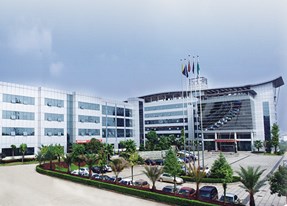 To comply with China's energy-saving policy, Zhuzhou Times New Material Technology (TMT), a subsidiary of the CRRC Group, has recently adopted Delta Energy Online as the right solution to monitor the energy consumption status of their vulcanization machines, so as to improve energy efficiency and reduce idling time. This application of Delta Energy Online was the first demonstration project for the CRRC Group. The functional objective was to provide an online monitoring infrastructure for energy, environment, and security.
To comply with China's energy-saving policy, Zhuzhou Times New Material Technology (TMT), a subsidiary of the CRRC Group, has recently adopted Delta Energy Online as the right solution to monitor the energy consumption status of their vulcanization machines, so as to improve energy efficiency and reduce idling time. This application of Delta Energy Online was the first demonstration project for the CRRC Group. The functional objective was to provide an online monitoring infrastructure for energy, environment, and security.
Background
The CRRC Group is a heavy-weight among the world's largest manufacturers and solution providers for rail traffic equipment. It also has a hefty domestic presence that dominates the development and manufacture of railway vehicles, locomotives, subways, their parts, and components. As a subsidiary enterprise to the CRRC Group, TMT serves a rubber processing and manufacturing function by providing the vulcanization process required by a variety of machinery and equipment.
According to China’s Thirteenth Five-year Plan for 2016 to 2020, there will be stricter development standards to meet in areas such as green ecology, social culture and environment-friendly manufacturing. To support the Chinese government's energy-saving policy, TMT began to tackle the energy consumption issue posed by its vulcanization machine, a major energy consumer. As required by production needs, the vulcanization machine must maintain a high temperature above 150ºC, even after products are ejected from their molds and up until the next vulcanization begins. During this idling period its temperature must be kept at a constant high. Otherwise, the machine needs to reheat for 1-2 hours before it can work again, which wastes power.
Challenges
The challenge for TMT was how to make the idling vulcanizer's preheating time as brief as possible without undermining its availability for production, and to minimize energy consumption, while maximizing energy efficiency. This was a practical challenge that TMT had to meet. Lacking a proper energy management system, TMT needed to collect energy consumption data and interface with the pre-existing production management systems for better energy efficiency. It also needed to cut power wasted in equipment idling time during production.
Constantly culling energy use information from the production site, an energy management system can provide real-time alerts for production process problems, while filtering out distracting false alarms.
Delta Solutions:
● Automatic collection and conversion of energy data into helpful and valuable information
Power consumption data for key production facilities can be constantly collected and offered to enterprise management for analysis of total energy consumption. Instant alarms can put managers on alert for problems happening within their production facilities, while filtering out false alarms. Energy consumption data collected can be discerned down to the device level, such as energy consumption status for a single machine, to try to improve its energy efficiency. The energy information can then be displayed on a customized interface, such as an electronic Dashboard, for greater worker awareness of the current energy status, and for further input for energy-saving strategies.
● A high degree of integration with other third-party devices and systems to increase production efficiency and conserve energy
Delta has introduced Delta Energy Online to a variety of scenarios, such as for conventional, and high-tech industries, helping find potential hot spots for further energy-savings from individual devices and entire systems. With TMT's requirements for energy conservation, Delta Energy Online takes further steps to integrate energy consumption data with various system parameters, such as temperature, pressure, and even work orders provided by the production management system. Having more accurate real-time idling alerts, the workshop manager can take measures to address energy issues in the production facilities. The energy-saving awareness of front-line workers is also heightened for increasing productivity and maximizing energy efficiency.
Dashboard
